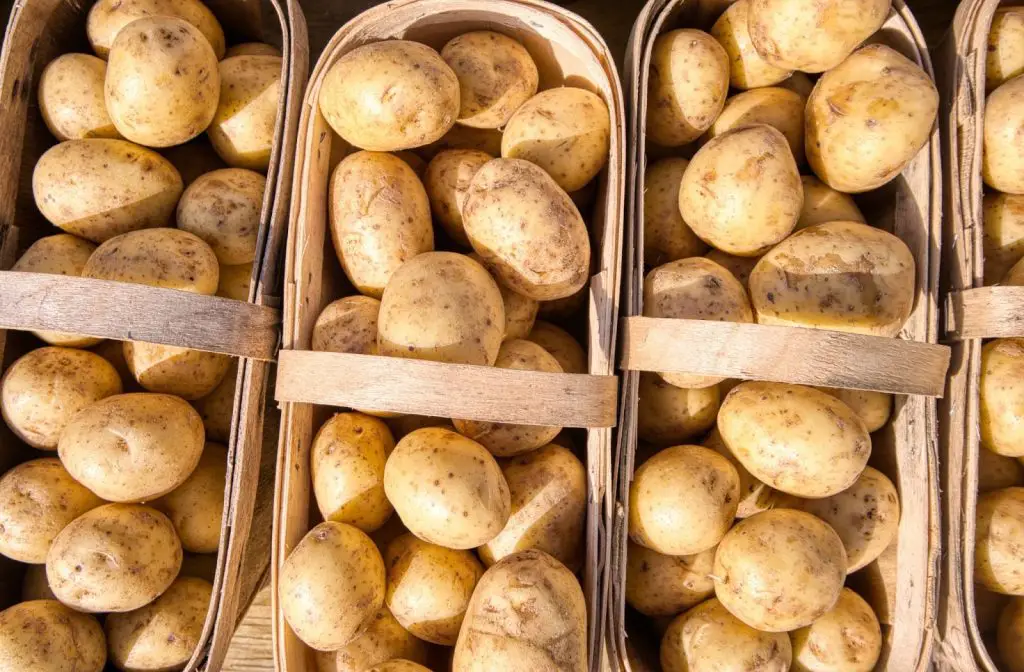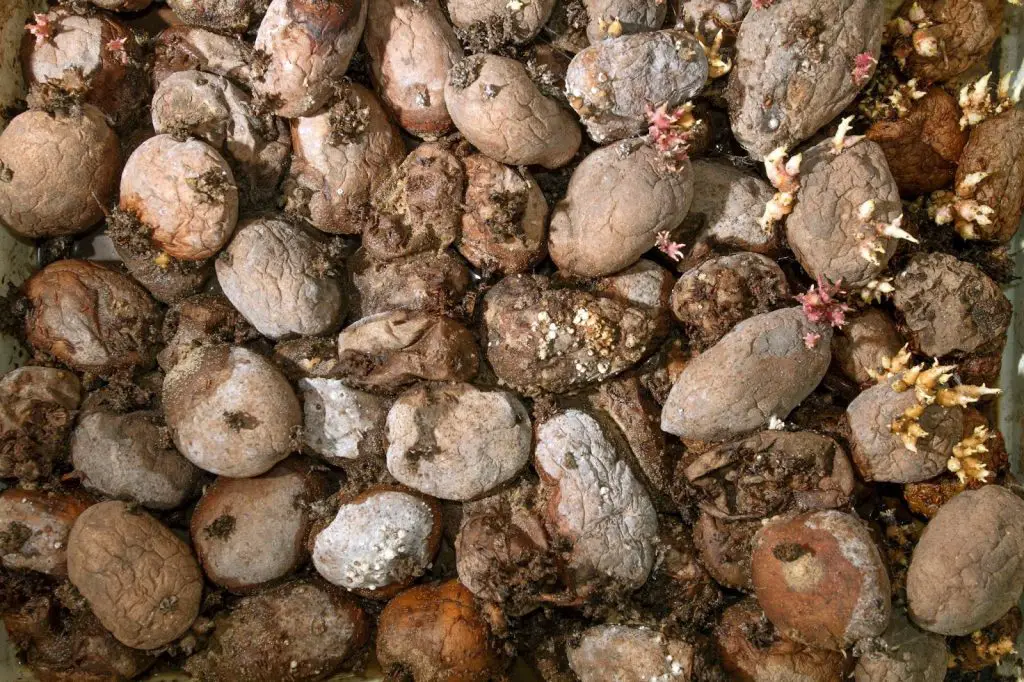Pantry-stored potatoes may last up to ten months in a pantry as long as you keep them in ventilated containers and keep the pantry cool and dry.
How Long Should You Store Potatoes In The Pantry?
Potatoes stored in a pantry can last up to ten months. By comparison, potatoes stored in a refrigerator have a short life of only two to three weeks.
Storing potatoes stored in the pantry lasts the longest because it is a cool, dry, ventilated space (source).
What’s Wrong With Storing Potatoes In A Refrigerator?
Potatoes can be stored in a refrigerator for up to two weeks before they start sprouting, losing their texture or shriveling. Even storing them in a bottom vegetable drawer is not going to prevent potatoes from decaying.
The problem with storing potatoes lower than 50 degrees is that the starch in the potato converts to sugar. This results in green and brown discoloration, the result of premature decay.
When potatoes are stored in the refrigerator, the exposure to moisture can cause rotting that is hidden in the vegetable’s core. Rotting potatoes stink, and the smell can easily transfer to other foods.
The pantry is a preferable place to store potatoes. It is a cool dark place at room temperature. Potatoes retain their taste, smell, texture, and color.
What About Freezing Potatoes?
Frozen potatoes can last up to 12 months in the freezer. However, to retain their firm texture and fresh flavor, they need to be peeled, blanched, chopped, and deposited into a sealable freezer bag or airtight container. This prevents discoloration and the development of a rotten sweet flavor.
How to Store Potatoes In Your Pantry
Keeping potatoes in an open plastic bin or basket in a pantry cupboard keeps them fresh. Even better are the breathable plastic storage containers with lids (link to Amazon) that have holes in them.
If you don’t have a bin or breathable container, you can wrap potatoes individually in aluminum foil and store them in a drawer bin in your pantry.

Tips for Keeping Potatoes Fresh
Here are some tips for keeping potatoes fresh that also explain why your pantry is the best place to store them.
Avoid Light
Light exposure triggers potatoes to start developing hard white buds that later become sprouts. Aside from encouraging new growth, light can also encourage the growth of mold spores on the potato skin.
Avoid Warmth
Potatoes left in warm temperatures grow green spots, molds, and bacteria
Never Store Potatoes In Plastic Bags In Your Pantry
You should never store potatoes in plastic bags in your pantry. The combination of warm air and a lack of ventilation will cause the potato to rot. And Stink!
Never Store Potatoes Under The Sink
The place beneath your sink is a dark, dank are with a bit too much humidity. The result is potatoes that try to sprout or that absorb smells from your pipes or nearby garbage.
Discard Rotten potatoes Immediately
If you notice a bad potato, immediately throw it away. Molds, bacteria, and solanine (a toxin that turns potatoes green) can cause mild to severe food poisoning.
Is Your Potato Rotten?

Potatoes with obvious signs of spoilage should be thrown out immediately. That includes potatoes that have spots, shriveled skin, and a soft, moist texture.
Signs of spoilage that should not be ignored:
Mold
Eating moldy potatoes causes mild food poisoning. Signs of mold include black spots or fuzz on the potato surface.
If you find one moldy potato in your pantry, then you need to throw out the whole bunch.
Foul Odor
A potato can appear to have nothing wrong with it, but if it smells foul, then discard it. Normal potatoes have an earthy odor, but rotten ones can have sweet, musty or mushroom-like odor.
Sprouts
The “eyes’ ‘ or green sprouts you see on potatoes indicate that the potato itself is turning to compost, enough so that it can grow more inside of its skin.
Don’t address this situation by cutting out the eyes, and consuming it anyway. Just toss them out.
A potato that sprouts will taste bitter. This is because they contain compounds called glycoalkaloids. Glycoalkaloids cause nausea, headaches, vomiting and diarrhea.
Green Potatoes
If a potato has a shiny greenish hue, then throw it out. The green indicates the presence of a toxic glycoalkaloid called solanine. This toxin causes headaches and gastrointestinal issues.
Tips For Storing Potatoes In A Pantry
Here are some tips for storing potatoes in a pantry.
- Never wash potatoes before you put them in your pantry, as the excess moisture can encourage mold growth.
- Never store peeled potatoes in a pantry as they can rapidly grow bacteria at room temperature.
- Store potatoes in paper bags rather than mesh or plastic bags.
Final Thoughts
A breathable bin in a cool dark place in your pantry is the absolute best place to store potatoes. This way they won’t be exposed to the moisture, high temperatures and light that cause them to rot.
This is why a pantry is a great place to store many types of vegetables, including onions, carrots, parsnips, and yes potatoes.
Recommended Reading:
- How to Organize Cereal Boxes in the Pantry
- How to Store Bread To Maintain Freshness (Best Practices)
Declutter your home once and for all (Even if you have no time and don't know where to begin)! Learn More.

